Nearly 50 years after he first got elected to the U.S. Senate, Joseph Robinette Biden Jr. accepted the Democratic Party’s nomination for president, promising to “represent all of us, not just our base or our party,” offering himself as a stark contrast to the current occupant of the White House.
Biden declared “this is not a partisan moment, this must be an American moment” and said “hope is more powerful than fear.” He pledged to lead the nation through the pandemic, economic turmoil and the partisan divide that has characterized the last four years.
“If you entrust me with the presidency, I will draw on the best of us not the worst. I will be an ally of the light not of the darkness,” he said.
Without ever mentioning Donald Trump by name, Biden sought to firmly differentiate himself from the current president: “United we can, and will, overcome this season of darkness in America. We will choose hope over fear, facts over fiction, fairness over privilege.”
Standing before a bank of U.S. flags without an audience, Biden gave a forceful case for himself as the person who could reverse what he said was the nation’s declining status in the world and a lack of concern for each other across partisan differences.

